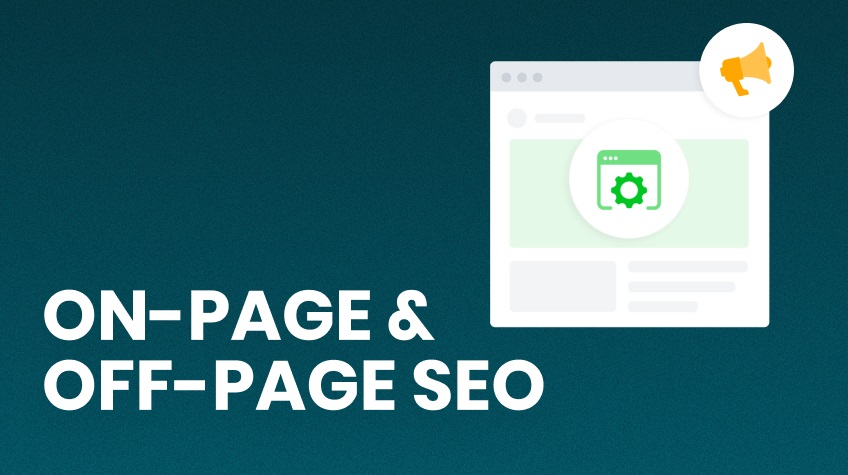
SEO Stands for Search engine optimization, it is a multidimensional field that requires knowledge of various techniques and tools for the process. It mainly focuses on optimizing numerous websites to get higher visibility in search results to increase organic traffic with effective user engagement.
On the other hand, on-page and off-page SEO tools would provide maximum effectiveness for these experts’ strategies. On-page SEO refers to the process of optimizing individual web pages, while off-page SEO takes a different route, with a path that focuses on building authority and trust through outside signals. What are on-page and off-page SEO? Why are SEO tools important? And, most importantly, what are the best tools out there for each category?
What is On-Page SEO?
On-page SEO is the practice of optimizing one individual web page so that it ranks higher and gets more relevant traffic in search engines. It involves many factors such as content quality, the use of keywords, the use of HTML tags, and even the general architecture of a website.
Fine-tuned on-page SEO allows search engines to understand the content of a page easily, which is why it’s extremely important for organic traffic. Key components include:
- Title Tags and Meta Descriptions: These tags help pass on the topic of a page to both search engines and users.
- Headings and Subheadings: Improper use of H1, H2, and H3 tags can leave the content very unstructured, which is unusable and rubbish content.
- Content Quality: Well-researched and compelling content can uplift user experience and dwell time, which is a major ranking factor.
- Internal Linking: Linking to other relevant pages on the same site can enhance navigation and spread link equity.
What is Off-Page SEO?
Off-page SEO deals with everything you do outside of your website which affects you in SERPs. It primarily focuses on building authority and trust through backlinks and social signals. Major points include:
- Backlinks: links from other high-quality sources tell the search engines that your content is credible and worth seeing.
- Social Media Engagement: You can share on different social media sites to magnify the reach to wider audiences and bring in traffic.
- Influencer Outreach: You will be working with the influencer who is likely to get the right work and bring in a backlink and brand mention.
Why are SEO Tools Essential?
SEO tools play the most critical roles both on-page and off-page because they come with insights, data, and automation that ensure your website performance is improved. Let’s have a look at why you need these tools :
➡ Need of On-Page SEO Tools
An on-page SEO tool offers chances for optimization identification and performance metrics tracking. Here, you can enable experts to analyze Keyword rankings as follows:
- Analyze Keyword Rankings: A determination of those keywords that drive the most traffic where amendments must be made.
- Audit Site Performance: Evaluate page speed, mobile-friendliness, and general usability because all these are taken into consideration when ranking.
- Optimize Content: Provide suggestions on improving content based on trending and competitor insights.
➡ Need of Off-Page SEO Tools
Off-page SEO tools are very essential in creating a good backlink profile that will support the site’s online presence. These tools assist the experts to:
- Analyze Backlink Profiles: Highlight the best quality backlinks as well as those spots that require improvement.
- Track Brand Mentions: It tracks how the brand is being mentioned around the web to understand reputation and engagement.
- Do Competitor Analysis: Understand what competitors are doing, and look for potential gaps to capitalize on.
Best On-Page SEO Tools
Let’s have a look at some of the best on-page SEO tools that experts should consider:
1. Google Keyword Planner
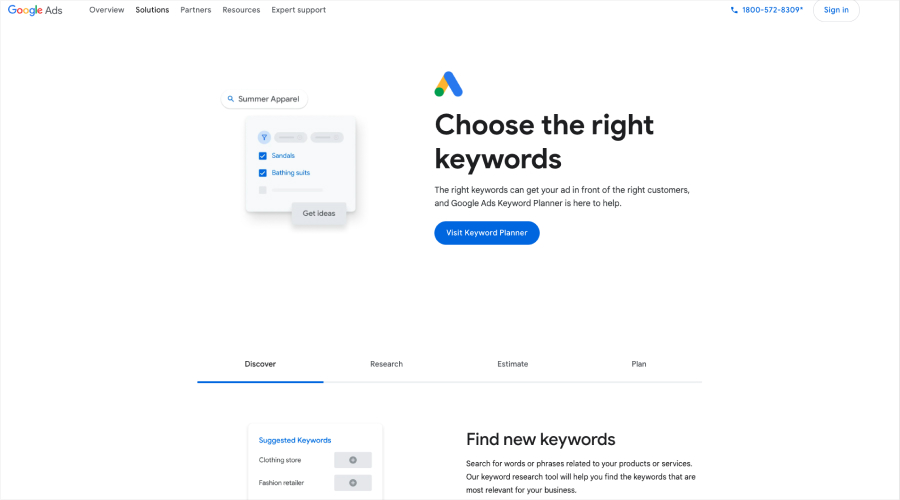
Google Keyword Planner is a free tool for keyword research, structured and analyzed. It’s a free tool that is part of any SEO strategy, where users can find new keywords by entering phrases or categories, even URLs of websites.
One of its strong features is the fact that it offers data that is quite useful for valuations in terms of search volume, competition levels, and suggested bid prices for paid campaigns.
This kind of knowledge is indispensable to identifying the keywords that can create targeted traffic for a website. Additionally, this tool allows users to possess forecasting capabilities based on the keywords selected so that they can further plan content and optimize it for search engines.
2. Moz Pro
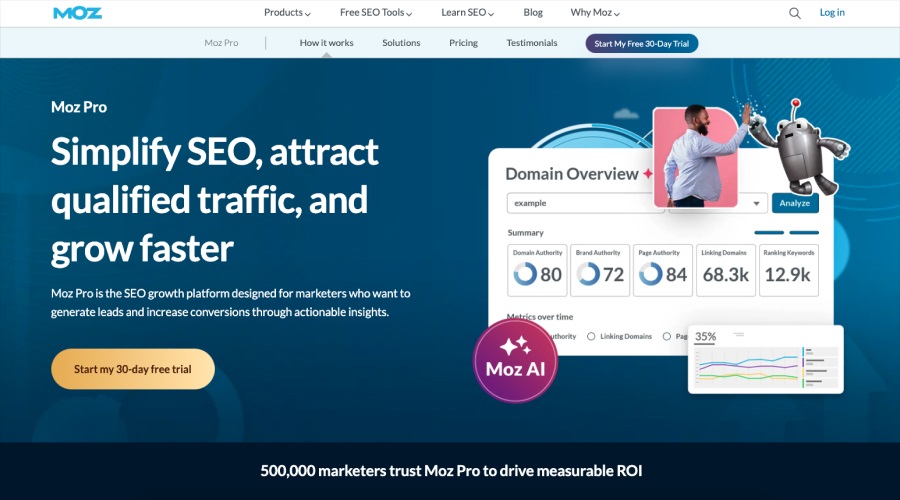
Moz Pro can be said to be a comprehensive SEO software suite offering all the different features, ranging from keyword research to link building and even site audits. With a site audit, a user can carry out an in-depth evaluation that indicates issues on the page, which could be missing title tags, duplicate content, or perhaps broken links.
Moz Pro Keyword Explorer Also helps in discovering and analyzing keywords. It provides metrics such as search volume and difficulty scores, providing essential information to optimize the content. It also suggests page optimization based on a competitive analysis. Running this tool will increase the performance of any website and enhance its position in SERPs.
3. SEMrush On-Page SEO Checker
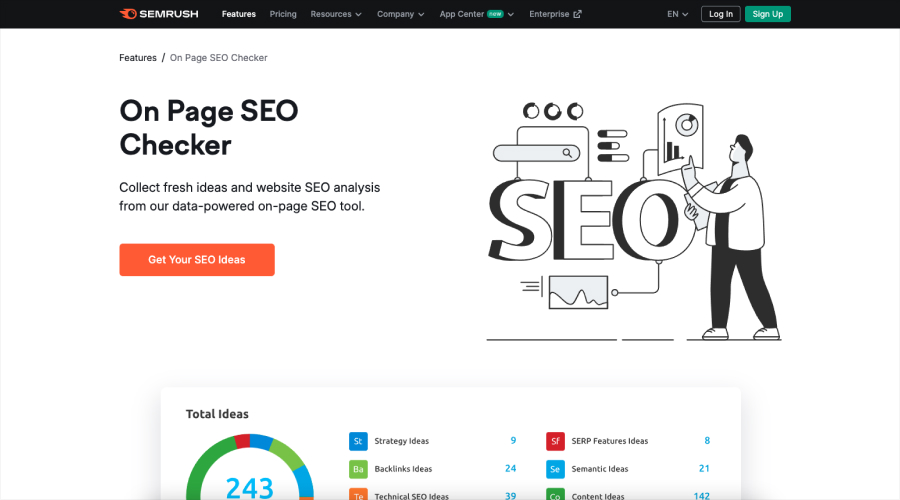
A more advanced tool like SEMrush On-Page SEO Checker will help in the optimization of web pages according to trends set up today in SEO and competitive analysis. The tool features a content analyzer evaluating the performance of individual pages, providing actionable recommendations for improvement.
With such a tool, one can discover relevant keywords and phrases to include in their content so that it matches the search of the users. The tool also makes competitive benchmarking. That is, it will allow users to compare their on-page SEO efforts with those of the top competitors. This widens the scope of guaranteeing that users can effectively improve website positioning in search engines.
4. Sitechecker
Sitechecker offers powerful capabilities for On-Page SEO that help optimize website content and improve search engine visibility. One of Sitechecker’s features is Page Counter.
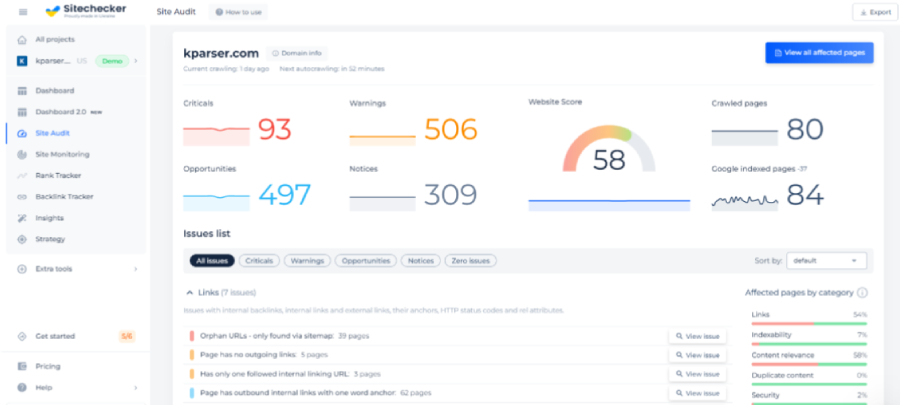
With this tool, you can easily find and identify all the pages on your site. It gives you a complete view of your site’s structure and helps make sure that all sections are properly indexed by search engines. This tool also helps you identify various technical issues that may be affecting the performance of your site. You can view a list of pages with specific problems and get instructions on how to fix them.
Using the Website Page Counter tool, you can not only monitor the number of web pages and their indexing status, but also identify technical issues that may be affecting your site’s On Page SEO. This will allow you to take proactive steps to improve your site’s performance and increase its overall visibility in search engine results.
5. Yoast SEO
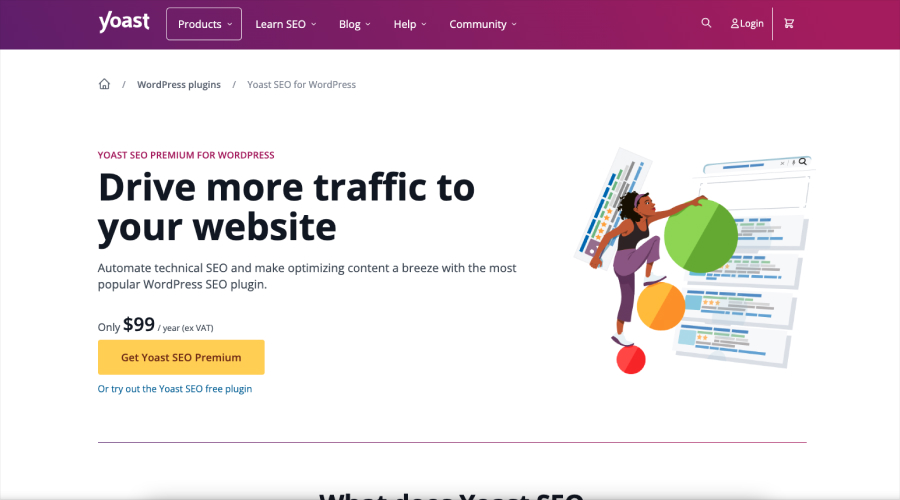
Yoast SEO is a free WordPress plugin that makes optimization for on-page SEO as easy as pie for everybody. Hence, it gives actual content analysis in real time and informs users about keywords use, readability, and metadata for posts or pages the users are writing.
Its snippet preview feature helps users see exactly how their content will appear in the search result-it’s an important part of optimizing click-through rates. It even automatically generates XML sitemaps, which makes search engines simply index the website efficiently.
Because it boasts a user-friendly interface and makes straightforward recommendations, Yoast SEO is a must-have for any WordPress user who wishes to optimize their site’s on-page SEO.
Best Off-Page SEO Tools
1. Ahrefs Link Explorer
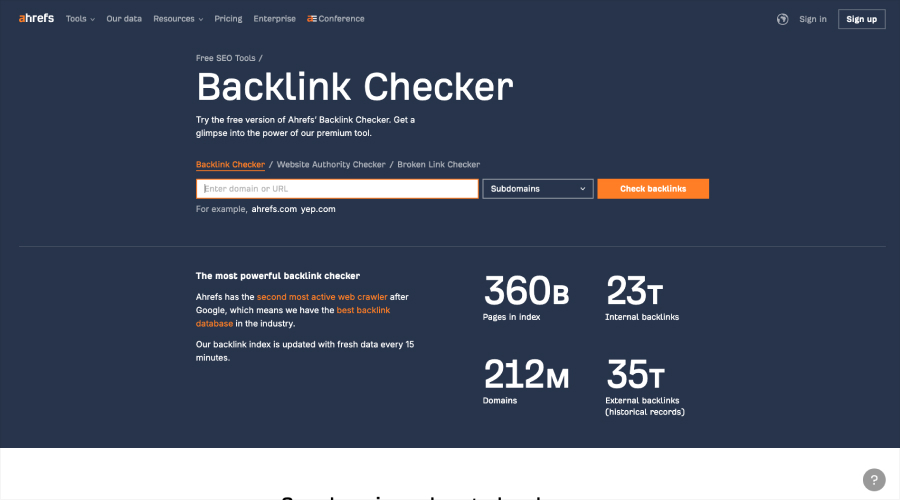
Ahrefs Link Explorer is one of the top tools that help with comprehensive backlink profile analysis, which is vital for off-page SEO techniques. It provides a view of all backlinks pointing to his site or competitors, providing him with insight into the quality and quantity of such links. Users can analyze referring domains so they may learn how the general authority of the site is affected by these.
The tool also gives information regarding anchor text distribution as well, thus allowing users to see which anchor texts are being used with the backlink. This information proves to be very useful for the fine-tuning of link-building strategies and further strengthening a robust backlink profile.
2. SEMRush

SEMrush is a comprehensive SEO suite that provides tools for on-page as well as off-page SEO, including substantial backlink analysis. The company’s backlink audit tool can prove to be rather beneficial while finding damaging backlinks to a user’s site, which may be harming their ranking position.
SEMrush provides domain analysis; a feature that lets the user compare the domains with its competitors and hence understand the competitors’ as well as one’s link-building strategies.
Moreover, the dashboard also offers social media tracking features, so this tool tracks brand mentions and engagement across all social platforms. That’s an all-rounded approach to SEO, which makes SEMrush an absolute must-have to gain a better online presence.
3. Moz Link Explorer
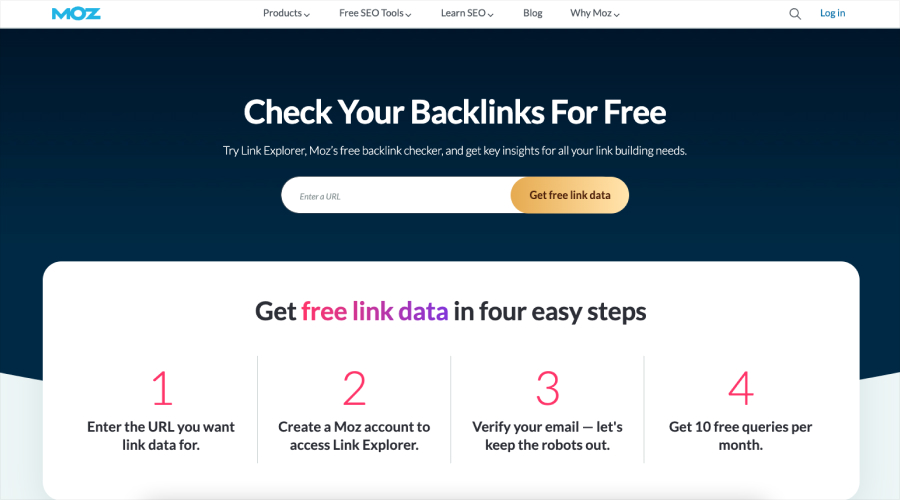
Moz Link Explorer is yet another tool specifically tailored for backlink analysis, providing essential insights into the backlink profile for the websites. These tools help users to analyze what’s pointing towards their site or their competition, giving them insights about the quality and authority of those links.
Moz Link Explorer provides valuable metrics like domain authority and spam scores, which can help users gauge the potential impact of backlinks on their SEO efforts. This tool is very useful, especially if you are developing a high-quality backlink profile and finding quality sites to reach, therefore enabling users to bolster their overall link-building strategy.
4. BuzzSumo

This is a content research tool that focuses on popular content and influencers in certain niches. It can help find trending topics for users, analyze different types of content across various platforms, and discover what strikes a chord with audiences.
Moreover, BuzzSumo assists with influencer outreach by showing important influencers in virtually any niche. It makes it easier to reach people who would likely promote more of the writer’s content and improve their online presence.
The app tells you about backlinks into popular content, which can help fuel users’ content plans as well as off-page SEO work.
5. Majestic

Majestic focuses solely on backlink analysis, with parameters that measure the number and quality of backlinks. Its Trust Flow and Citation Flow metrics help the user to understand the strength of their link profile as well as that of competitors. It makes use of Site Explorer for analyzing a website’s backlinks compared to others, which throws light on an effective link-building campaign.
With its historical data capabilities, Majestic enables users to understand trends and changes in their backlink profiles over time, which can inform future SEO campaigns and link-building strategies.
Also Read: On Page SEO and Off Page SEO Differences
Conclusion
In the always-evolving world of SEO, one of the most crucial factors needed to stay ahead of competitors is experience and proper equipment. Tools, such as Google Keyword Planner and Sitechecker, give vital insight for making website content adjustments. Off-page tools, including Ahrefs Link Explorer and SEMrush, will further enlarge backlink strategies and increase a brand’s visibility.
With the help of these tools, experts can significantly enhance their SEO efforts, attract more traffic, and get a website promoted in this digital world. Besides providing the best benefits of on-page and off-page SEO tools, they are also essential to ultimately succeed in this heavily marketed online competition world.







well written. one of the best articles that i havever come accross